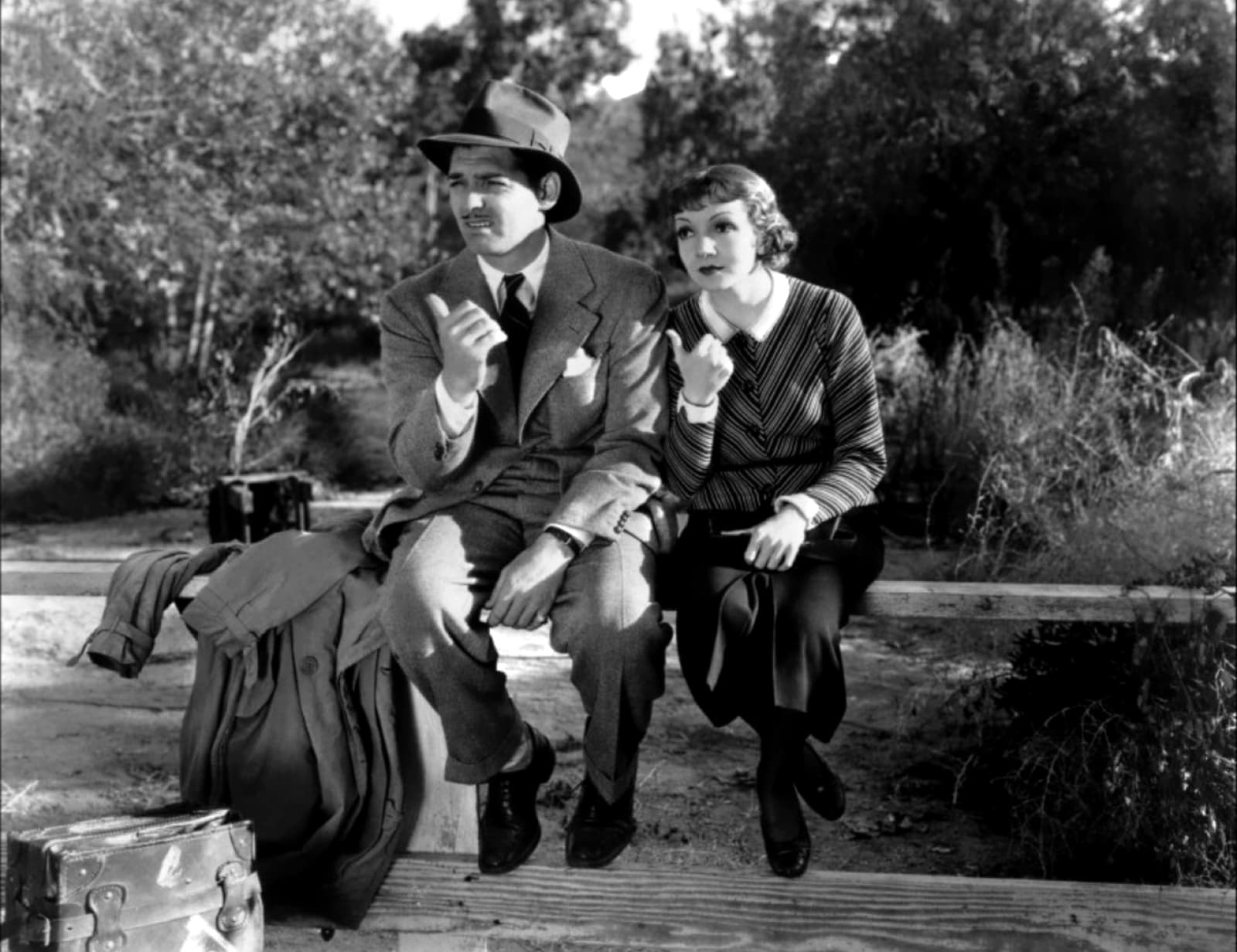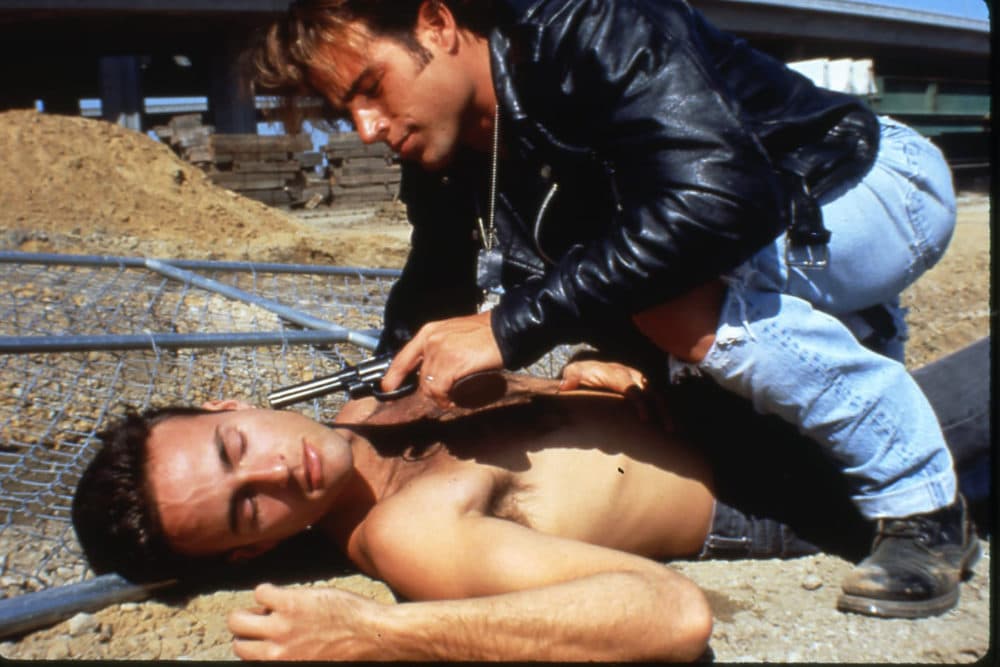Advertisement
The Brattle encourages viewers to get 'Lost in America' with film series

Given the increasingly likely possibility that it will not have another, one can’t really be blamed for wanting to celebrate America’s 246th birthday by getting lost. Luckily it’s a big country, and the Brattle Theatre has a dozen movies screening over 10 days starting Saturday, July 2, that rack up more mileage than an entire season of “Diners, Drive-Ins and Dives.” Running concurrently with an eardrum-shattering new 4K restoration of David Lynch’s intensely upsetting “Lost Highway,” the Brattle’s “Lost in America” retrospective takes a more expansive, less terrifying view of U.S. interstates, with stories of weary, sometimes silly travelers losing their way and finding themselves.
The series kicks off with the prototypical road movie and template for pretty much every romantic comedy that followed. Frank Capra’s endlessly delightful 1934 “It Happened One Night” stars Claudette Colbert as a runaway heiress trying to get from Florida to New York with four dollars in her purse and Clark Gable as the louche newspaperman who realizes he’s just stumbled onto the story of a lifetime. The two bicker and banter along the back roads of a Depression-ravaged America, the movie somehow remaining buoyant but clear-eyed about the country’s very real woes — a Capra specialty. Gable’s swaggering macho man (scandalously seen here sans undershirt) has a gallant streak he’s bad at keeping secrets, and something about this prissy damsel in distress can’t help but melt his heart. Ours as well.
Fifty-four years later, a similar sort of love story unspooled in director Martin Brest’s “Midnight Run.” You’ll have to take my word for it, but at the time audiences were shocked by the sight of a pre-“Fockers” Robert De Niro deigning to do comedy — a genre in which he hadn’t dabbled since Brian De Palma’s underground anti-war satires in the ‘60s. The tightly-wound Method actor loosens up to hugely enjoyable effect here as a gruff bounty hunter charged with bringing in Charles Grodin’s persnickety mob accountant, a witness wanted very badly by both the Feds and the gangsters he ripped off. The stars’ killer chemistry scored most of the initial accolades, but what makes “Midnight Run” so rewatchable is one of the decade’s great, crackerjack ensembles, including Dennis Farina, Yaphet Kotto, John Ashton, Joe Pantoliano and Philip Baker Hall. De Niro has always been our finest phone actor and this film features some of his most memorable calls.
Like a lot of kids my age, I learned that there was no basement in the Alamo from “Pee-wee’s Big Adventure.” So it’s fitting that the Brattle is spending the Fourth of July with Paul Reubens’ peculiar man-child, especially since the film’s spoiled, rich-kid villain Francis grew up to become the 45th president of the United States. (One must admit, the resemblance is uncanny.) It’s an even better film than you might remember — a winking riff on Vittorio De Sica’s “Bicycle Thieves” with a script by Reubens, Michael Varhol and “Saturday Night Live” legend Phil Hartman constructed like one of those Rube Goldberg devices that delivers Pee-wee his breakfast in the mornings. Director Tim Burton, making his feature debut, is in perfect sync with his star’s anarchic sensibility, conjuring a kitschy American landscape both whimsical and deeply weird. If you go to Monday’s screenings, tell ‘em Large Marge sent you.
There are few visual flourishes more semiotically loaded than “American Honey” director Andrea Arnold outfitting Elvis’ granddaughter Riley Keough in a Confederate flag bikini, but alas, that’s about where my admiration for the 2016 picture ends. A discordant, Dickensian jaunt in which runaway teens sell scam magazines subscriptions door-to-door for 163 minutes in Walmart country, it’s one of those hugely ambitious projects in which a European artist comes over here and gets all tripped up trying to explain America to itself. (Call it ”Rattle and Hum” syndrome.) You’re much better off checking out the late show of Kathryn Bigelow’s vicious vampire Western “Near Dark,” which is hard to find on home video and infuriatingly unavailable to stream. The splattery 1987 cult classic features a movie-stealing turn from Bill Paxton and eagle-eyed viewers will spot Bigelow’s soon-to-be-ex-husband James Cameron giving him the finger.

Albert Brooks’ 1985 masterpiece of yuppie malaise “Lost in America” stars the cringe-comic as an advertising exec who with his flighty wife (Julie Hagerty) attempts to quit the rat race and drop out of society, liquidating all their assets and hitting the open road in a Winnebago. The trip begins with vague, idealistic notions that are quickly dashed when she squanders their nest egg at a roulette table. It’s a mercilessly funny movie — Garry Marshall gives one of the great one-scene performances as a harried casino manager — about how not all of us are cut out to be easy riders. (According to legend, Danish director Nicolas Winding Refn did not understand the film was a comedy and found himself so frightened by Brooks’ anger that he cast him as a psychotic mobster in his 2011 “Drive.”)
Finally, the series closes out with a splenetic time capsule from a previous plague era. Gregg Araki’s 1992 “The Living End” exploded into arthouses a year before Tom Hanks and “Philadelphia” made it safe for movies to talk about AIDS. An unfocused eruption of justifiable rage, the film follows two HIV positive young lovers who kill a cop and hit the road on a crime spree with the motto “f--- everything.” It’s an urgent and confrontational piece of work, billing itself as “an irresponsible movie by Gregg Araki” while queering up all-American iconography of muscle cars and the open road with an aesthetic equal parts Godard and Andy Warhol. “The Living End” is often amateurish, but the film’s anger is indelible. We could use more like it today.
“Lost in America” runs at the Brattle Theatre from Saturday, July 2, through Monday, July 11.

